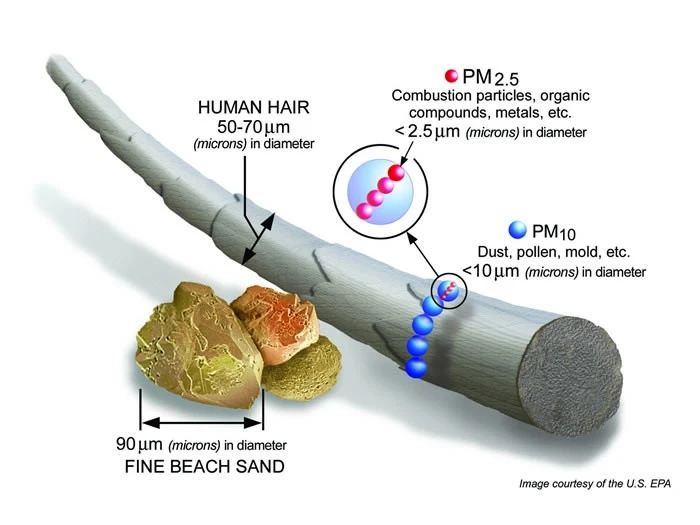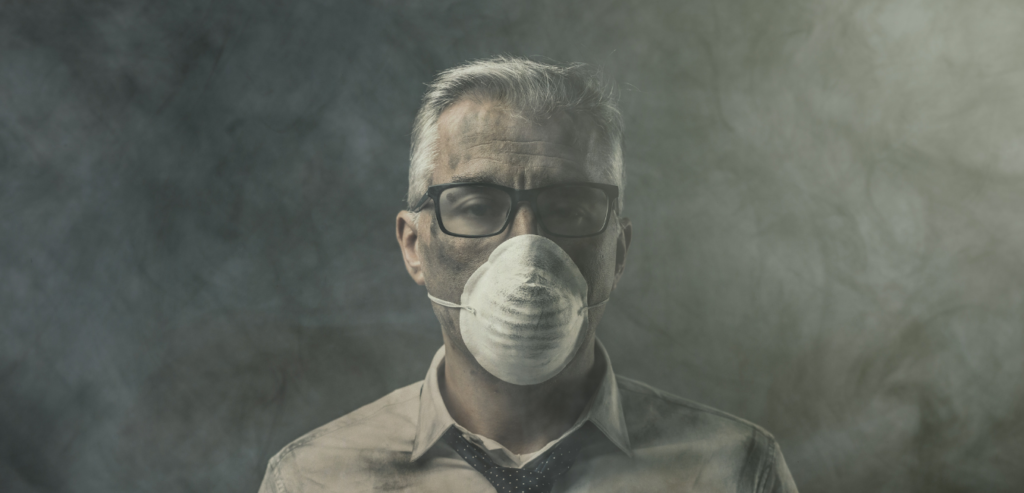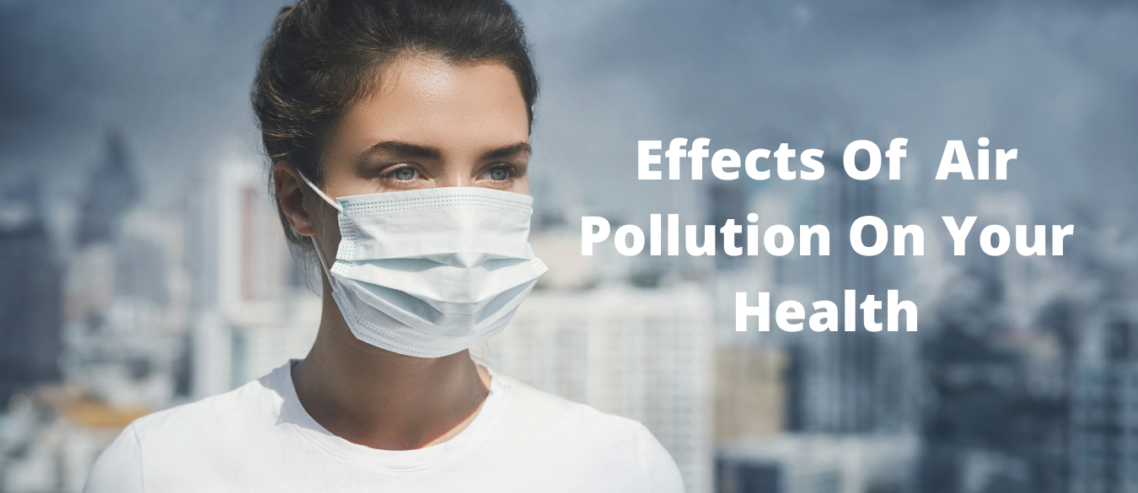3 Effects Of Air Pollution On Your Health
WHO estimates that 9 out of 10 people breathe in polluted air worldwide. Poor air quality or Air Pollution can have adverse effects on your health. Air pollution has come up as a major health risk and it is estimated that poor air quality has resulted in 6 million premature deaths.
Poor air quality can cause irritation in the eyes, nose and throat that can further cause serious problems like asthma and affect the cardiovascular system. Breathing polluted air for a long time can cause serious health problems especially in children and the elderly. Even healthy adults who spend a lot of time outdoors suffer from respiratory problems because of air pollution.
What Causes Air Pollution?
Vehicular movement, industrial pollution or natural calamities mostly cause air pollution. The presence of harmful particles and gases in the air makes the air unhealthy to breathe. The presence of natural gases in quantity more than what is healthy makes it dangerous for health.
The invisible threat of air pollution includes a mixture of small particles and gases as listed below.
#1. Particular Matter
Particular matter present in the air is mostly formed because of the reaction of different pollutants present in the air. The Source of most PM is the burning of fossil fuels by power plants and automobiles. The size of these particular materials is tiny, the PM10 particles are less than 10 microns in diameter and fine PM2.5 particles are less than 2.5 microns in diameter. For your better understanding, 1 Micron = 1 Millionth of a Meter.

The particles this small penetrate easily deep into the lungs and make breathing difficult. These PMs have the potential to cause heart attacks, strokes, asthma and, in extreme cases, death.
#2. Nitrogen oxides (NO and NO2)
Combustion engine vehicles mainly exhaust nitrogen oxide (NO) and nitrogen dioxide (NO2) gases into the atmosphere. The presence of these Nitrogen oxides in more than prescribed limits causes many health risks. It can cause asthma and bronchitis and put you at high risk of suffering from heart disease.
#3. Ozone (O3)
Ozone is mainly present high-up in the atmosphere to protect us from harmful ultraviolet radiation coming from the sun. But the increasing level of ozone at the ground level is problematic. Ozone on the ground mainly gets formed by the reaction of various gases produced because of fossil fuel burning. Overexposure to ozone can cause chronic respiratory and heart diseases.
#4. Sulphur dioxide (SO2)
The burning of fossil fuels with sulphur contents emits SO2 this includes coal and diesel-burning. Sulphur dioxide can cause respiratory infection, asthma and affect your cardiovascular systems. Sulphur dioxide, after combining with water, forms sulfuric acid, which causes acid rains.
Effect of Air Pollution and Poor Air Quality on Your Health
The air containing a high concentration of pollutants have the potential to harm the respiratory functioning of humans. You have probably read about all the pollutants present in the air, above, that have the potential to harm your health.
Let’s now discuss how your different organs can get affected by your exposure to the pollutants.
#1. Effecting The Lungs
The Particular matter present in the air can go deep into airways because of its small size. It has the potential to cause significant damage to the lungs.
The effect of pollutants on health can vary according to your exposure to the pollutants. The effects also vary as per the region, weather and season of the year.
Acute Effects of Air Pollution Exposure On Lungs
Acute effects include sudden and severe effects that occur after exposure to a high concentration of air pollutants. If you get exposed suddenly to a high concentration of air pollutants, you can have the following symptoms.
- Wheezing
- Excessive Sneezing
- Irritation in the airways
- Shortness of the breath
- Asthma attack in some cases
Chronic Effects of Air Pollution Exposure On Lungs
Chronic effects include damage to the lungs that happen over a long period of time. Chronic lung diseases occur over time with regular exposure to the air, with high levels of pollutants. The chronic diseases caused as the effect of regular exposure to pollutants include.
- Chronic obstructive pulmonary disease (COPD)
- Pulmonary hypertension
- Asthma
- Cancer
The difference between the Lungs exposed to Delhi pollution gets damaged more quickly compared to a person living in Himachal. The study by Delhi doctor on lungs condition has produced the following results.
In the picture below, the lung with more blacking is of a person living in Delhi and the other is of the person living in Himachal.

You can see for yourself and understand the effect air pollution has on your lungs.
#2. Heart
After lungs, it is the heart that suffers from the effects of air pollution. Air pollution can affect the circulation of blood and can cause heart attack like situations.
No doubts air pollution is harmful to the heart and researchers have shown the following effects on your heart and blood circulation.
- Damaged inside walls of your blood vessels, making them narrow and hard.
- Restricted movement of your blood vessels, resulting in increased blood pressure and strain on your heart.
- Increased chances of blood clotting.
- Abnormal heart functioning.
- Causing changes in heart structure, which relate to early stages of a heart failure.
#3. Brain
Recently done studies on the effect of air pollution on the brain have found out that high levels of air pollution can affect cognitive abilities. We can define cognitive ability as the mental capability of reasoning, problem-solving, planning, thinking and learning from experience.
Exposure to polluted air can damage the cognitive abilities of children and can cause a decline in cognitive thinking among adults. Polluted air exposure can also result in people falling into depression.
The PM pollutants which were initially thought to be harmful to the lungs have the potential to cause cognitive impairment and dementia. Especially amongst those who have been overexposed to the polluted air.
What You Can Do To Reduce Air Pollution?
Now you might be curious about how you can work towards reducing air pollution. Here you can find the list best 7 ways by which you at an individual level can help reduce the polluted air.

7 Best Ways to Help Reduce Air Pollution
#1. Using Public Transport Or Carpooling
Vehicular movement is one of the biggest contributors to air pollution. You can help in reducing the pollution done by cars by making the right choices. You can prefer to use public transports where ever possible. You can also go in for carpooling with your colleagues travelling to the same office every day. Or using options like Uber pool whenever you need to take a cab.
#2. Walking Or Using Cycle
Don’t get into the habit of using a car or two-wheeler whenever you travel. Make it a habit to walk or use a cycle to travel nearby distances. It will have two effects, one being your reduced carbon footprint and the other you will be healthier.
#3. Planting Trees
Trees are nature’s answer to control air pollution. Nature has designed trees to take in carbon dioxide and release oxygen into the atmosphere. The Particular Material also gets deposited on the leaves of trees and gets washed away when it rains.
So, you need to plant more trees or at least make sure there are enough trees planted in and around your house to provide you with clean air to breathe.
#4. Using Electric Vehicles
Electric Vehicles are the eco-friendly option available in the market. Owning an electric vehicle will not only help you reduce your carbon footprint. But it will also help you save money in way of low overall running costs. Read here the benefits of owning an electric vehicle.
#5. Saying No To Plastics
Plastic, once known as a miracle material, is one of the most polluting materials now. The menace created by plastic waste all around the world is vast. Above that, plastic production also releases a lot of greenhouse gases. Saying no to plastic products is our way ahead for a cleaner and greener earth.
You can start by stopping the use of single-use plastics and slowly eliminating all sorts of plastics from your life. And make a switch toward eco-friendly products.
#6. Using Eco-Friendly Products
Replacing regular products with eco-friendly products in your daily routine will go a long way in helping you eliminate plastic usage. The use of eco-friendly products like bamboo toothbrushes, reusable water bottles will help you reduce your carbon footprint.
Check here for the list of eco-friendly products that you can own.
#7. Adopting An Eco-Friendly Lifestyle
An eco-friendly lifestyle is all about implementing environment appropriate behaviour into your life. This includes using public transport, saying no to plastics, and using eco-friendly products. Living an eco-friendly way doesn’t limit to these things, but you can get started with living eco-friendly life by adopting these things.
Conclusion
As many as 22 out of the world’s 30 most polluted cities are in India. If that doesn’t force you to take action against increasing air pollution, then what will?
The WHO report in 2013 declared air pollution as most detrimental to human health. The polluted air not only harms the lungs but can also damage your heart and brain. Pollutants like PM2.5 are most dangerous as they can easily penetrate the human body’s defences. And results in acute and chronic lungs diseases.
The effect of air pollution can be reduced by planting more trees. And it can be reduced if we all start living an eco-friendly lifestyle.
Read more about the effects of the environment on your health here.
If you have anything more to add about air pollution, feel free to comment below or write to us.


Comments
6 Comments
[…] out of 10 people worldwide breathe polluted air as per WHO estimates. Poor air quality has many adverse effects on health as it could affect your lungs, heart, and […]
[…] You can see for yourself understand how badly lungs are affected by air pollution. Which can further lead to many other organs getting damaged. […]
[…] disorders. A study found that high symptoms of anxiety were observed in people who were exposed to high amounts of PM10 and PM2.5 in the air. The Anxiety-related symptoms were even worst in those with pre-existing health […]
[…] pollutants in the air can have adverse effects. Visit here to read more about the health effects of polluted […]
[…] Here you can read about other effects of air pollution on your health. […]
[…] You might know the adverse effects of breathing polluted air that is not limited to damaged lungs. Read this to know more about the adverse effects of polluted air on […]
Comments for this post are closed.